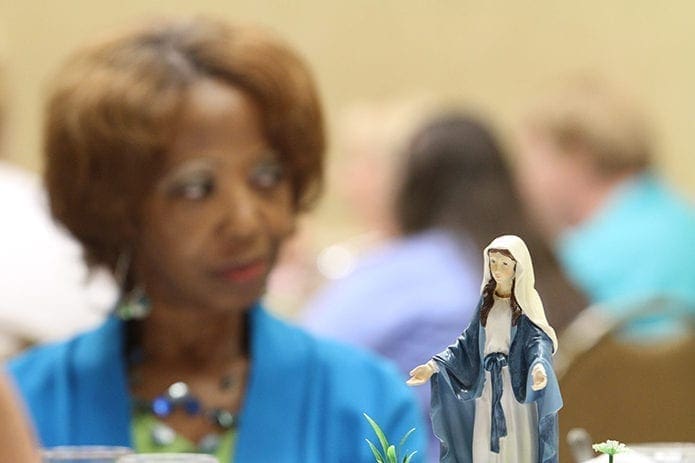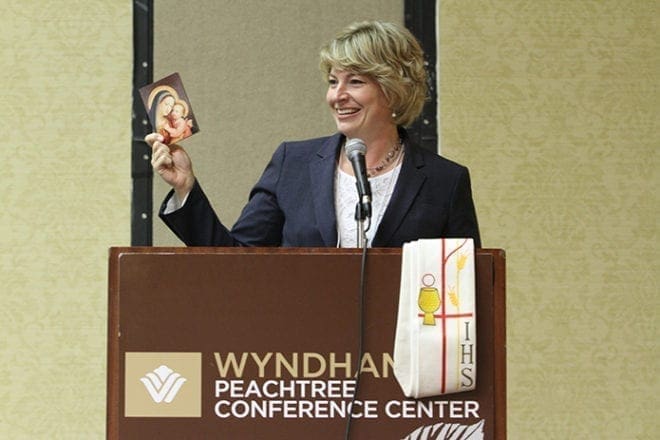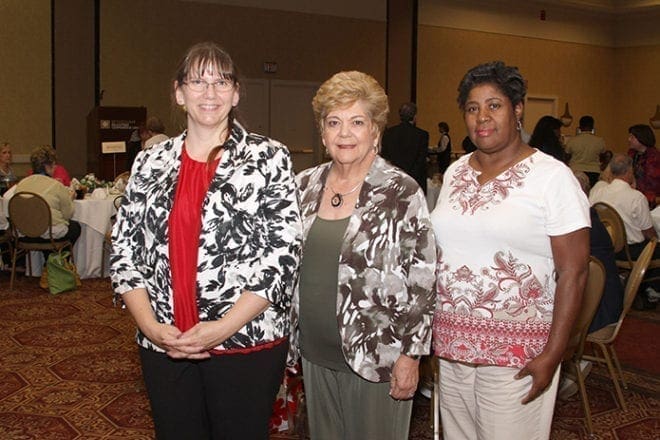 Photo By Michael Alexander
Photo By Michael AlexanderPeachtree City
Women’s gathering asked to believe as Mary did, share Holy Spirit
By JEAN DRISKELL, Special to the Bulletin | Published October 11, 2013
PEACHTREE CITY—“Encouraged by the Faith of Mary” was the theme of the 57th annual convention of the Atlanta Archdiocesan Council of Catholic Women held at the Wyndham Peachtree Conference Center Sept. 6-8 with 151 in attendance.
Speaking at the convention, Father Kevin Hargaden encouraged women to accept the word of God spoken to them wholeheartedly, as Mary did, and to replicate her generous sharing of the Holy Spirit with family and friends.
“Our Mother’s faith has blessed us,” Father Hargaden said. “Our Mother’s faith encourages us. Mary is the Blessed Virgin Mary. Blessed because she believed that the word spoken to her by the Lord would be fulfilled.”
“So I wonder, what word has the Lord spoken to you?” he asked. “Have you been willing to take it in, let it fill your heart, let it fill your soul? Are you like our Blessed Mother, willing to say yes, willing to believe?”
God, who speaks through Scripture, is working in and through each person. God’s word can be consoling and challenging, the priest said.
“Mary had to suffer,” Father Hargaden said, “and still she believed that this word given her, this Word that was made flesh, would be fulfilled.” She was able “to see not only the shadow of the cross but the light of the resurrection.”
Mary also “shows us the powerful dynamics of simple encouragement in the Visitation,” he said. “She goes to support her cousin, Elizabeth. It is one of the most beautiful gifts women have with each other.”
Father Hargaden said that Elizabeth had a splendid awe and Mary shared the Holy Spirit with her. This is worthy of contemplation and imitation, the pastor said. “Mary shared in family and in love the very Holy Spirit that God had given her. When we go to visit with one another, we share the very Spirit of God.”
“To know the gifts, to recognize the many blessings, to always thank God,” he said, “is to have that Spirit, like the Blessed Virgin, of gratitude and of praise.”
Father Hargaden said that women’s lives are “always about the wonderful relationship with the Lord and through him with one another. That we, like Mary, hear his word and believe; that we, like Mary, support one another and share the Spirit the Lord grants us; that we, like Mary, be filled with thanksgiving and ever return praises to our Lord.”
The theme was chosen to dovetail with a Marian year in the Atlanta Archdiocese.

Singer and inspirational speaker Kitty Cleveland gives the keynote address during the luncheon on the influences of Mary in her life. Here she holds up a prayer card of Our Lady of Good Counsel. Photo By Michael Alexander
All women of the archdiocese are members of the AACCW, which is comprised of parish women’s councils that are organized by deanery and that serve the church in many local, national and international projects. During the convention, a new election was held and the gavel of president was passed from Dana Lee Willis to Deanna Holmer.
Willis told the gathering that the role of leadership “has been a blessing for me.”
“I needed to do this. This was the journey and so I took it,” she said.
“We have been pushed to serve—to serve God first, serve our family, and serve our community. I have tried to make it my mission to make sure that AACCW has shone through each one of us out there in the archdiocese and beyond,” Willis said.
Receiving the gavel, Holmer said she was “blessed to be counted among you.”
“Your work and your prayers and your dedication to this organization are what make it work so well. With your love and support that I feel in this room, I know that we can do this together and I’m looking forward to the journey,” she said.
Other posts filled were that of the president-elect, Julie Pardo, the secretary, Jacqueline Marshall, and the treasurer, Audrey Lee.
During the convention, Kitty Cleveland, an inspirational speaker and gifted singer from the Archdiocese of New Orleans, gave her personal testimony, which centered around her father, Carl, a successful lawyer and Catholic deacon, who was wrongfully imprisoned and later released after his conviction was reversed by a U.S. Supreme Court ruling.
Cleveland said when her father was first indicted for white collar crimes, she drew great consolation from reading the diary of St. Faustina, the Polish nun who fostered the devotion to Jesus as the Divine Mercy.
The saint’s diary “helped me to hear the voice of Jesus speaking to me personally,” Cleveland said.
She called this time a several-year nightmare for her parents, herself and her sisters.
When the jury returned its guilty verdicts, Cleveland said she started crying.
“As I was crying in the courtroom, I received a special grace from Mary. With my face in my hands, all I could see was the Divine Mercy image of Jesus. So I kept praying over and over again, ‘Jesus, I trust in You,’” she said.
“One act of trust in such moments gives greater glory to God than hours passed in prayer,” Cleveland said. “One act of trust when it makes no sense to trust. When you’re terrified, incredible graces for you and glory to God that you would trust Him in those moments.”
She said her father was sentenced to 10 years in federal prison in Florida. The family “would go monthly, sometimes weekly,” from Louisiana to visit him. They would sing for the prison Mass. “Attendance would triple and we suddenly found ourselves with a prison ministry,” she said.
An appeal failed so Cleveland said that she and her mother had to learn to trust God daily.
“God asks us to trust and to trust that we get the grace for the day. We have the grace for the moment,” she said.
“My dad, ironically, found his greatest peace at this point,” she said. He told her he let go of all his expectations of what his life was supposed to look like. “He lived alone with Jesus,” she said.
“I learned a beautiful lesson from my dad in all of that,” Cleveland said. “I ended up writing a song for my dad called ‘Surrender.’ My dad realized that everything he had feared losing was an illusion and that God was all he needed to possess.”
“People started writing to him. He wrote a monthly newsletter from prison,” she said. “He could really listen with his heart. His ministry as a deacon had never been more powerful than from prison.”
Six months after the appeal failed, the U.S. Supreme Court asked to hear her father’s case. His lawyers petitioned the trial judge to let him come home while the case was reviewed. The judge signed his release at 3 p.m. on the Thursday between Easter Sunday and Divine Mercy Sunday. Three o’clock is called the “hour of mercy” in the writings of St. Faustina.
“Then in the fall of 2000 the U.S. Supreme Court unanimously reversed my father’s conviction,” she said, “and they said that the crimes he had been accused of were not even crimes. For six years he was gone.”

The new board members include (l-r) Deanna Holmer of St. Mary’s Church, Toccoa, Julie Pardo of St. Ann’s Church, Marietta, and Audrey Lee of St. Paul of the Cross Church, Atlanta. They will serve as president, president elect and treasurer, respectively. Jackie Marshall will serve as secretary. The women serve two-year terms. Photo By Michael Alexander
Cleveland said that her father had three very happy years after his release and then was diagnosed with an aggressive form of prostate cancer and lived for another three years. Four days after he came home for hospice care, the family received a call and was told that he had been reinstated as a deacon. Cleveland said that all her father could say upon hearing the news was “Wow. God is good.”
Nine days later her father died and was buried in his vestments. His funeral “was truly a celebration of a life well-lived, especially because of the person he had become,” she said.
Cleveland also sang as part of her luncheon talk, including several original songs she has written.
The AACCW was able to engage Cleveland as the keynote luncheon speaker at the convention with the help of a grant from the Catholic Foundation of North Georgia.
Father William M. Williams, AACCW spiritual advisor, and pastor of St. Gerard Majella, Fort Oglethorpe, spoke on the spirituality of Mary with a reflection on Our Lady of Good Counsel, the patroness of the AACCW.
He said that the image of Our Lady of Good Counsel appeared in a village in Italy in the 1400s and was declared authentic by Pope Leo III in 1467.
“Mary as Our Lady of Good Counsel consoles us and helps us to understand how we can reach out to others,” Father Williams said, “and console them from our own experiences, from our own journey with God.”
He continued, “Mary teaches us that with faith we are people of good counsel to others. Mary opened herself to be one who could be an imitator of trust, of love, of mercy.”
The image of Our Lady of Good Counsel is Mary looking at her Son and he is looking back at her.
“He, Jesus, draws us into this relationship,” Father Williams said. “We are to look up to her. She looks back at him with the prayers that she has for us and her cares for us in this world.”
Father Williams said that Mary offers intercession for people constantly, praying that God’s will be done, that people will have an understanding, a realization of God’s love, care, and grace for them.
“To be a good counselor you have to be a person of prayer,” he said. “You have to have a dialogue with God. You have to have an experience of being open to the ways that God works in our hearts and lives.”
Father Williams also spoke of Mary as a woman who totally trusted God.
“She was totally vulnerable, totally opened, totally trusting that God’s care for her will be done,” he said. “God asks us to have that same kind of vulnerability, same kind of hopefulness and trust in our own lives.”
“Mary abandoned herself to his care in her walk with God,” Father Williams said. “She was totally human accepting the divine into her life, into her heart. She becomes the model of what church is.”
Other speakers included Jack Murphy, who serves on the board of the St. Vincent de Paul Society and is the national chair of Voice of the Poor, the Society’s advocacy and education effort.
He spoke on how the St. Vincent de Paul Society has been helping those in need for over 150 years worldwide. Volunteers go in pairs to visit people in need and to help them financially, give them food, and listen to them.
Murphy said that in the year 2000, the National Society of St. Vincent de Paul decided they needed to do more to advocate for the poor, so Voice of the Poor was established.
“Our mission statement for Voice of the Poor is to research and document issues that are concerns for those in poverty and to make recommendations to our national board, which speaks on our behalf,” he said. “Our goal is to act as an unified voice.”
He spoke on SNAP, the Supplemental Nutrition Assistance Plan formerly known as food stamps, and on the need for Medicaid expansion under the Affordable Care Act. Georgia is opposed to the Medicaid expansion, but Murphy said it could provide health care for some of the 600,000 Georgians who are uninsured.
Frank Mulcahy, executive director of the Georgia Catholic Conference who represents the Catholic bishops of Georgia at the state legislature, spoke briefly on the ongoing lawsuit with the Department of Health and Human Services’ mandate over contraceptive issues that go against the teaching of the Catholic Church. He also spoke on immigration and the U.S. bishops’ support for comprehensive immigration reform. There are an estimated 11 million people who are “already here in the United States without documentation, without sanction,” he said. The bishops support a path to citizenship, he said. “It is not amnesty,” he said, but a process with stipulations that would, in part, require applicants to present background information, pay back and current taxes, pay fees to apply to become a citizen and have a clean criminal record.